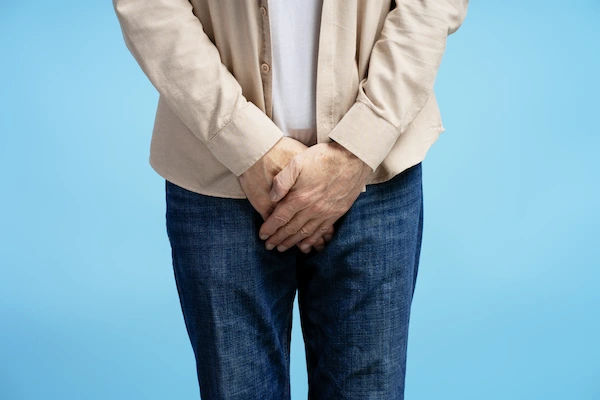Waking Up to Pee? Your Complete Guide to Managing Nocturia
Know about nocturia, what it is, causes, how to manage nocturia and more.

Written by Dr. Rohinipriyanka Pondugula
Reviewed by Dr. Vasanthasree Nair MBBS
Last updated on 13th Jan, 2026

Introduction
That dreaded 2 AM trip to the bathroom and the one at 4 AM can feel like an inevitable part of life, especially as we get older. But what if waking up multiple times a night to urinate isn't just a nuisance, but a treatable medical condition? Welcome to your comprehensive guide to the management of nocturia. Nocturia, the medical term for needing to wake up at night to urinate, affects millions and can severely impact your sleep quality, daytime energy, and overall well-being. We'll explore everything from simple behavioural changes and dietary tweaks to medical treatments, helping you and your doctor identify the best path forward to reclaim your restful nights.
What Exactly is Nocturia? More Than Just an Inconvenience
Nocturia is clinically defined as the need to wake up one or more times per night to void. While getting up once might be common and often harmless, waking up two or more times is considered clinically significant and worthy of attention. It's crucial to understand that nocturia is a symptom, not a disease itself. It signals that something is out of balance, whether it's your fluid intake, your bladder function, or another system in your body. The consequence isn't just fatigue; chronic sleep interruption from nocturia and sleep disruption can lead to decreased productivity, mood changes, and an increased risk of falls, especially in older adults navigating a dark house.
Consult Top Specialists for Personalised Tips
Nocturia vs. Nocturnal Enuresis: Understanding the Difference
A common point of confusion is the difference between nocturia and nocturnal enuresis (bedwetting). Nocturia involves waking up because you feel a strong, conscious need to urinate. You are awake and make a deliberate trip to the bathroom. Nocturnal enuresis, on the other hand, is the involuntary urination during sleep without waking. While both can disrupt sleep, their causes and management strategies for nocturia are distinct. This guide focuses exclusively on nocturia.
The Root Causes: Why You're Getting Up at Night
Effective management of nocturia begins with pinpointing the cause. The reasons generally fall into three main categories.
Global Polyuria: Your Body Makes Too Much Urine
This condition means your body produces an excessive amount of urine over 24 hours (typically more than 40 ml per kilogram of body weight). Common causes include uncontrolled diabetes (both type 1 and type 2), diabetes insipidus (a different condition related to water balance), and excessive fluid intake.
Nocturnal Polyuria: A Nighttime Fluid Shift
This is one of the most common causes, especially in older adults. With nocturnal polyuria, your urine production at night is disproportionately high compared to daytime production (often exceeding 20-33% of total daily output). This can happen due to:
Fluid Redistribution: Conditions like congestive heart failure, venous insufficiency in the legs, or sleep apnea can cause fluid accumulated in your legs during the day to be reabsorbed into your bloodstream when you lie down at night. Your kidneys then filter this excess fluid, leading to urine production.
Age-Related Changes: The body's natural production of an antidiuretic hormone (ADH), which tells the kidneys to produce less urine at night, often decreases with age.
Bladder Storage Problems: Reduced Capacity or Overactivity
Here, the issue isn't urine production but the bladder's ability to hold it. Causes include:
Overactive Bladder (OAB): The bladder muscle contracts involuntarily, creating a sudden, urgent need to urinate.
Benign Prostatic Hyperplasia (BPH): In men, an enlarged prostate can obstruct the urethra, preventing the bladder from emptying fully and reducing its effective capacity.
Urinary Tract Infections (UTIs) or Bladder Inflammation: These can irritate the bladder lining, causing frequent and urgent urination.
Mixed Nocturia: A Combination of Factors
Often, people experience a combination of these issues. For example, an older man might have mild nocturnal polyuria and BPH, making the symptoms of urinating multiple times at night much worse.
The First Step: Tracking Your Symptoms with a Bladder Diary
Before you or your doctor can decide on a treatment path, the single most powerful tool is a bladder diary (or voiding diary). This is a simple log you keep for 24-48 hours that tracks:
The time and volume of every urination.
The time you go to bed and wake up.
The type and amount of all fluids you drink.
The timing of your meals and medication.
This diary provides objective data that can reveal patterns. Are you drinking a large glass of water right before bed? Is your urine output much higher at night? A bladder diary template for nocturia can be easily found online or provided by your doctor. This is the foundational step for any effective management of nocturia.
Effective Management Strategies for Nocturia
The effective management strategies include:
Lifestyle Adjustments and Behavioural Therapies
These are always the first line of defense and can produce significant improvements.
Smart Fluid Management: What, When, and How Much to Drink
Timing: Shift your fluid intake to earlier in the day. Try to avoid drinking large amounts 2-3 hours before bedtime.
Type: Reduce or eliminate caffeine and alcohol, especially in the evening. Both are diuretics (they increase urine production) and bladder irritants.
Quantity: Ensure you're drinking enough during the day to stay hydrated, but be mindful of excessive consumption later on.
Dietary Tweaks: Identifying and Avoiding Bladder Irritants
Certain foods and drinks can irritate the bladder. Common culprits include spicy foods, acidic foods (like tomatoes and citrus), and artificial sweeteners. Try eliminating one group at a time to see if your nocturia symptoms improve.
The Power of Leg Elevation and Scheduled Voiding
If you experience leg swelling, elevating your legs for a few hours in the afternoon can help redistribute fluid before bedtime, potentially reducing nocturnal polyuria. "Double voiding"—urinating, then waiting a moment and trying again—can help men with BPH empty their bladders more completely.
Managing Underlying Medical Conditions
If your bladder diary suggests an underlying issue, treating that condition is paramount. This might involve:
Optimising medication for heart failure or diabetes.
Using a CPAP machine for sleep apnea.
Managing Benign Prostatic Hyperplasia (BPH) with medication or procedures.
Treating a urinary tract infection with antibiotics. If symptoms like burning or fever accompany frequent urination, consult a doctor online with Apollo24|7 for prompt diagnosis and treatment.
Medications and Medical Interventions for Nocturia
When lifestyle changes aren't enough, several medications can help:
Desmopressin: A synthetic version of the antidiuretic hormone (ADH) that reduces urine production at night.
Diuretics: Taking a diuretic like furosemide in the afternoon can help flush excess fluid out before bedtime, rather than overnight.
Anticholinergics or Beta-3 Agonists: These medications help relax an overactive bladder muscle, increasing its capacity.
It is essential to never start these medications without a prescription and supervision from a healthcare professional, as they can have side effects and require monitoring.
When to Seek Professional Help: Don't Ignore These Signs
While lifestyle changes can help many, you should definitely see a doctor if:
Lifestyle modifications don't improve your symptoms after a few weeks.
You experience pain or burning when you urinate.
You see blood in your urine.
You have difficulty starting urination or a weak urine stream.
Nocturia is causing significant daytime fatigue or affecting your mood.
If your condition does not improve after trying these methods, book a physical visit to a doctor with Apollo24|7 for a comprehensive evaluation. They may recommend specific tests, such as a urine analysis or urodynamic studies, to get a clearer picture.
Conclusion
Living with nocturia can feel like a silent struggle, but it's important to remember that you don't have to accept sleepless nights as an inevitable part of life. The management of nocturia is a proactive journey that begins with understanding the "why" behind your symptoms. By methodically tracking your habits, implementing strategic lifestyle changes, and seeking professional guidance when needed, you can significantly reduce nighttime trips to the bathroom. The goal is not just to sleep through the night, but to wake up feeling truly rested and ready to face the day. Take the first step tonight, perhaps by starting that bladder diary and beginning to reclaim the peaceful, uninterrupted sleep you deserve.
Consult Top Specialists for Personalised Tips

Dr Suseela
General Physician
5 Years • MBBS
Bengaluru
Apollo Medical Center, Marathahalli, Bengaluru

Dr. Mainak Baksi
General Practitioner
13 Years • MBBS , MD (MPH)
Howrah
Mainak Baksi Clinic, Howrah
(50+ Patients)

Dr. Tanmaya Kumar Sahu
General Physician/ Internal Medicine Specialist
12 Years • MBBS, MD ( Internal Medicine )
Bhubaneswar
Apollo Hospitals Old Sainik School Road, Bhubaneswar
(25+ Patients)

Dr. Pinaki Mukhopadhyay
General Physician/ Internal Medicine Specialist
33 Years • MBBS
Kolkata
MCR SUPER SPECIALITY POLY CLINIC & PATHOLOGY, Kolkata
(25+ Patients)

Dr. Imtiyaz Khan
General Practitioner
6 Years • MD (Physician), Fellowship in Critical Care,AFIH
Bengaluru
Apollo Clinic, Sarjapur Road, Bengaluru
More articles from Frequent Urination
Frequently Asked Questions
Is waking up once a night to pee considered nocturia?
Waking up once per night is very common and often not a medical concern, especially as we age. Clinically, nocturia is typically diagnosed when you need to wake up two or more times per night regularly. However, if even one trip is disrupting your sleep and leaving you tired, it's worth discussing with a doctor.
What are the best natural remedies for nocturia in the elderly?
The most effective natural remedies for nocturia are behavioural: managing fluid intake (timing and type), elevating swollen legs in the afternoon, limiting salt intake to reduce fluid retention, and maintaining a healthy weight. Always consult a doctor before trying any herbal supplements, as they can interact with medications.
Can certain medications cause frequent urination at night?
Yes. Diuretics (water pills) prescribed for high blood pressure or heart failure are a common culprit. If you take a diuretic, ask your doctor if taking it earlier in the day (e.g., late afternoon instead of bedtime) could help. Other medications, like some for depression or nerve pain, can also affect urination.
How is nocturia related to sleep apnea?
There is a strong link. Sleep apnea causes intermittent drops in oxygen levels, which can affect heart function and lead to the release of a hormone (ANP) that increases urine production. Treating sleep apnea with a CPAP machine often significantly improves nocturia symptoms.
When should I be worried about frequent nighttime urination?
You should seek prompt medical attention if fever, chills, back pain, blood in the urine, or a sudden change in bladder control accompany frequent urination. These could be signs of a more serious infection or condition.
